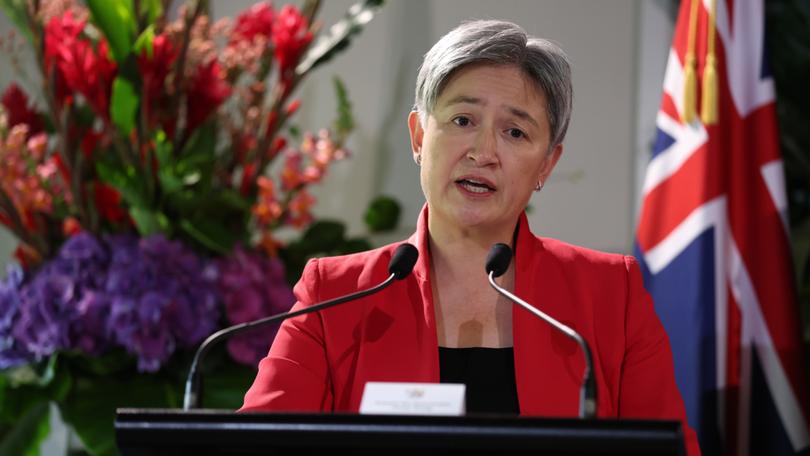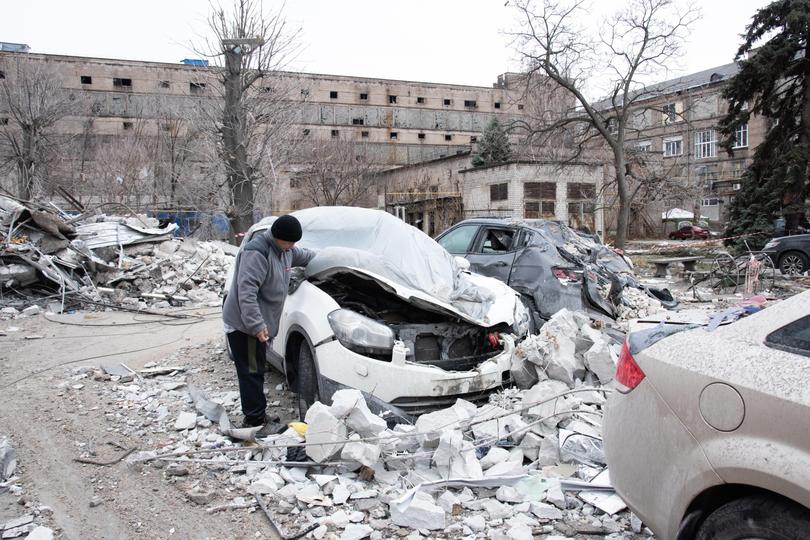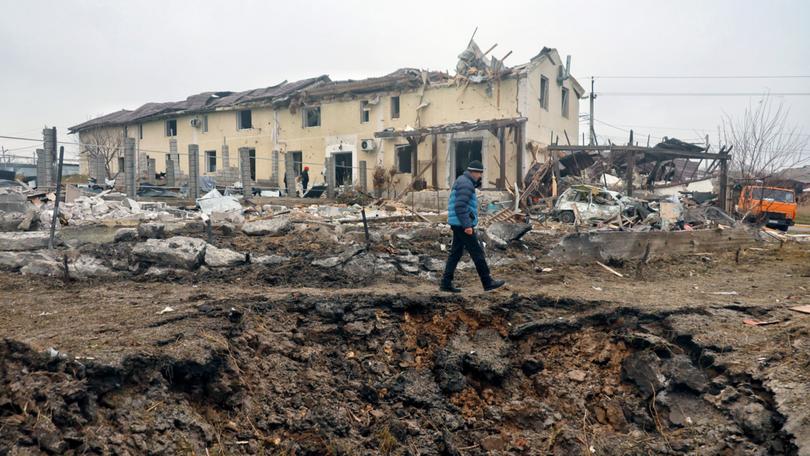LATIKA M BOURKE: Australia could help secure Ukraine with ‘boots on the ground’ says Estonian foreign minister
Estonia’s Foreign Minister says Ukraine’s security is ‘absolutely’ in the Indo-Pacific’s interests — with troops the best way to discourage Russia.

Australia could help secure Ukraine by providing boots on the ground to help deter Russian President Vladimir Putin from achieving his goal of conquering the country, Estonia’s Foreign Minister Margus Tsahkna has said.
The call came as Foreign Minister Penny Wong and Defence Minister Richard Marles touched down in London to discuss Ukraine, China and AUKUS with their British counterparts for the first AUKMIN talks with the new Labour government.
Australia will extend its contribution to the training of Ukrainian troops in the UK.
Sign up to The Nightly's newsletters.
Get the first look at the digital newspaper, curated daily stories and breaking headlines delivered to your inbox.
By continuing you agree to our Terms and Privacy Policy.The war in Ukraine remains Britain and Europe’s dominant security focus but attention is now turning to what sort of conditions could govern any ceasefire given US President-elect Donald Trump’s vow to end the fighting in one day and possibly before he is even inaugurated on January 20.
Mr Tsahkna said whatever assurances were given to Ukraine in any negotiations they had to be meaningful and backed up, unlike past agreements which President Putin violated for years before his full-scale invasion in 2022.
“I think that we need to discuss about the boots on the ground solution,” he told the Latika Takes podcast at the Estonian Foreign Ministry in Tallinn.
“If we are serious about the security guarantees, for the neighbouring country of Russia, these must be real.
“Because if we’re going to repeat the Minsk agreements in 2015 then Putin will start this aggression again, in Ukraine or somewhere else.”

Asked if Australia and other non-NATO member partners could form part of any Ukrainian missions as happened in Afghanistan, Mr Tsahkna said: “Of course, we have had different coalitions as you mentioned before.”
“What I see is that there are tensions in the Indo-Pacific region as well, I see more cooperation between NATO and Indo-Pacific on a very practical level,” he said.
“We need to understand that all these conflicts, they are connected so it is not only about the Russian aggression against Ukraine, there are many in the Indo-Pacific region as well because of China, because of North Korea.”
He said he could never have imagined that North Korean troops would be fighting in Europe when he became foreign minister in April 2023.

“China plays a huge role,” he said.
“I don’t believe moving North Korean troops into Europe was somehow possible without China knowing.”
But he argued the development was a major mistake by Putin.
“Because it changes the core of this conflict, more global,” he said.
“And this is not only the European problem or the Ukrainian problem anymore, it’s much wider.”
NATO has labelled China a “decisive enabler” of Russia’s war in Ukraine.
Mr Tsahkna said it was “absolutely” in the Indo-Pacific’s interests to ensure that Ukraine was secure from Russian aggression if any peace deal is struck.
“Because to secure Ukraine is about the interests of all the democratic countries of the world and I think that maybe even not democratic countries.
“If one country can change the principle that you can use military force to change the borders it can pave the way for many other conflicts in the world.”
Estonia, bordering Russia with a population of just 1.3 million, was occupied by the Russians until the collapse of the Soviet Union.
It is NATO’s second-highest spender behind Poland on security and pays more towards defence as a proportion of GDP — currently 3.43 per cent — than even the United States.
The government of Estonia is raising taxes to help pay for it and under the so-called Security Tax, a 2 per cent increase will be applied to VAT as well as personal and company profits taxes from the new year.
Estonia spends 0.25 per cent of its GDP on the Ukraine alone and will raise its defence spending to 3.7 per cent of its GDP by 2026.
It, along with the other Baltic states, is a leading campaigner for Ukraine inside Europe and wants the Ukraine to join NATO whilst larger powers like Germany and the United States do not.
While Australia is not a member of NATO, it contributed to the only military operation ever to have been triggered by the Alliance’s collective defence principle that states that an attack on one is considered an attack on all — was when the Twin Towers were hit on September 11.

But unlike the subsequent mission in Afghanistan, the United States is unlikely to commit troops to safeguarding Europe and even within Eastern Europe there is scepticism about the idea.
Last week, Poland’s Prime Minister Donald Tusk dismissed the proposal after hosting Emmanuel Macron in Warsaw — the French President has said Europe should not rule out putting troops into Ukraine.
Nigel Gould-Davies, senior fellow for Russia and Eurasia at the London-based International Institute for Strategic Studies think tank said boots on the ground would be a strong deterrent.
“Yes, I think there’s no question, Putin still fears NATO, he doesn’t want to take them on, he doesn’t want to challenge NATO directly,” he said.
“He doesn’t want to create a situation where NATO accepts that it is at war with Russia.”
But he said that it would be an enormous undertaking given the length of the Russian frontline which stretches around 1000 kilometres.
“When people talk about boots on the ground, one of the other things they have in mind is establishing a presence to monitor a ceasefire,” he said.
“That sounds plausible until you crunch the numbers.
“Back of the envelope calculation suggests you’re looking at 100-120,000 troops.
“Do we have that, are we prepared to commit that?”
He said that if the West had failed to commit the financial and military aid to Ukraine required to defeat Russia, it was questionable whether this would extend to manpower.
“We have demonstrated a lack of credibility,” he said.
He said there was also no natural leader in Europe strong enough to take up the cause because of France and Germany’s governments collapsing.
“For now, who’s there?”
He said while the UK could be “a leader” the country had “fiscal strains.”
